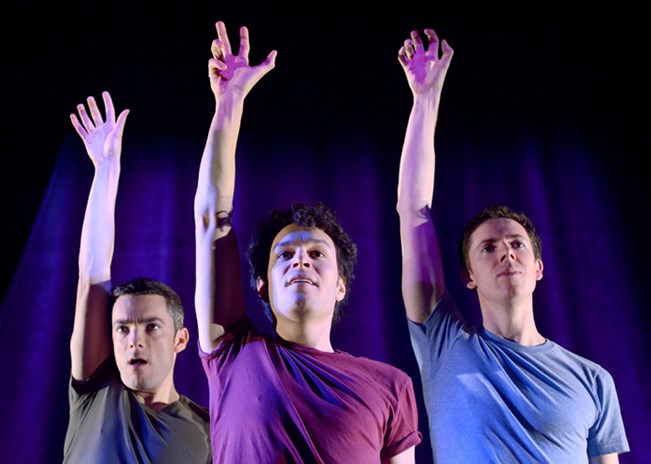The first thing actor/writer Paul Dunn says about the remount of The Gay Heritage Project is that this production is a lot of fun. The project, a collaboration with fellow playwright/performers Andrew Kushnir and Damien Atkins of Buddies In Bad Times Theatre, premiered in Toronto in 2013 and asks, is there such a thing as gay heritage?
Typically a word associated with familial lineage, heritage is a complicated concept when applied to the LGBTQ community. Research was no easy task given not much written record exists in queer history, unless you’re interested in arrest records – something Dunn found investigating within his own Irish and Scottish ancestry.
“We were told, ‘There can’t be a lot of gay history, because there weren’t gay people in the past.’”
So, they wondered - was there something that transcended gender or race that could trace a queer heritage?
The show consists of a series of fast-paced scenes and is constructed like a collage, where each scene tackles a different aspect of the gay past in an explorative, rather than presentational manner.
“There are no props, or costume changes and we play over 100 characters over the course of the evening,” Dunn explains. “Everyone in the audience will see a different show because you’re filling in all the blanks. It’s very specific and clear, but asks the audience to participate in an imaginative way.”
“Andrew likes to describe it as a three headed-one person show.”
Dunn says the production is rooted in vocal masque, a creation performance technique the trio studied as theatre arts students at Grant McEwan University, where the performance and written aspect are tied together, because they’re devised together.
“It means the movement and the text are quite inseparable in a way, and allows for exciting writing, on your feet,” he elaborates.
And, it’s funny. Dunn says the responses have been varied, that the audience laughs a lot, but they also weep and mourn.
“I think as gay writers and performers, we each have experienced the value and the power of humour in communicating to an audience complicated or painful ideas.”
But, the crowning achievement has been reaching those who come to see a show not directly representative of them, who perhaps feel its content doesn’t apply, but who end up feeling invited by the play to investigate their own heritage.
“We sharpened our need to investigate with our hearts and our imaginations, and in doing so, have done our best to create an enjoyable and highly entertaining piece of theatre for people.”
The Gay Heritage Project runs March 2-19 at Vancouver East Cultural Centre. Tickets at Tickets.TheCultch.com


